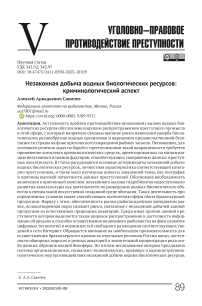Незаконная добыча водных биологических ресурсов: криминологический аспект
Автор: Савичев А. А.
Журнал: Виктимология @victimologiy
Рубрика: Уголовно-правовое противодействие преступности
Статья в выпуске: 1 т.10, 2023 года.
Бесплатный доступ
Актуальность проблем противодействия незаконному вылову водных биологических ресурсов обусловлена широким распространением преступного промысла в этой сфере, с которым напрямую связаны высокие риски нанесения ущерба биологическому разнообразию водных организмов и нарушения продовольственной безопасности страны на фоне критического сокращения рыбных запасов. Несомненно, для успешного решения задач по борьбе с преступлениями такой направленности требуется применение комплекса криминологических средств, ориентированных на минимизацию негативного влияния факторов, способствующих совершению данных преступных посягательств. В статье раскрываются основные детерминанты незаконной добычи водных биологических ресурсов, личностная характеристика соответствующей категории преступников, и такие мало изученные аспекты заявленной темы, как география и причины высокой латентности данных преступлений. Обоснована необходимость включения в причинный комплекс незаконного вылова гидробионтов недостаточного развития аквакультуры как деятельности по разведению водных биологических объектов в специальной искусственно созданной среде обитания. Такая деятельность при определенных условиях может способствовать вытеснению сферы сбыта браконьерской продукции. Наряду с этим, обеспеченность рынка рыбопосадочным материалом (малек, оплодотворенная икра) снижает риски, связанные с незаконной добычей данной продукции из естественных природных акваторий. Среди иных причин данной преступности автором выделяется также широкое распространение и доступность информации об орудиях и способах осуществления незаконного рыболовства на фоне развития цифровых технологий и возможностей свободного размещения соответствующих сведений в сети Интернет. Обращается внимание на наибольшую привлекательность для осуществления браконьерского промысла отдельных регионов России ввиду доступности обширных морских и речных акваторий и значительной концентрации ряда особо ценных образцов водной биосферы. По итогам исследования автором предложена система организационных, социально-экономических, правовых и административно-политических мер противодействия незаконной добыче водных биологических ресурсов.
Охрана водных биологических ресурсов, экологическая преступность, браконьерство, география экологической преступности, рыбохозяйственные бассейны, аквакультура
Короткий адрес: https://sciup.org/14127238
IDR: 14127238 | УДК: 343.92, | DOI: 10.47475/2411-0590-2023-10109
Список литературы Незаконная добыча водных биологических ресурсов: криминологический аспект
- GrinkoSD. Illegal extraction and smuggling of aquatic biological resources. VestnikVoronezhskogoinstituta FSIN Rossii [Bulletin of the Voronezh Institute of the Federal Penitentiary Service of Russia]. 2020; 4: 117-121.(In Russ.). https://elibrary.ru/item.asp?id=44822192
- Grinko SD. Illegal trafficking of aquatic biological resources is one of the threats to Russia's economic security. Pravo I gosudarstvo: teoriya I praktika [Law and State: theory and practice]. 2020; 1 (181): 289-292.(In Russ.). https://elibrary.ru/item.asp?id=43111335
- Kalenov SE. Illegal extraction of aquatic biological resources: causes and prevention. Sibirskij yuridicheskij vestnik [Siberian Legal Bulletin]. 2003;1: 75-80.(In Russ.). https://elibrary.ru/item.asp?id=18228246
- Shcheblykina IV. Problems of legal regulation of countering transnational organized crime in the field of illegal extraction of aquatic biological resources. Sovremennoe pravo [Modern law].2012;9:116-119. (In Russ.). https://elibrary.ru/item.asp?id=17936322
- Parshina IA. Criminological characteristics of organized environmental crime. Criminal policy and culture of combating crime: materials of the International Scientific and Practical Conference. September 20 , 2019. Krasnodar, 2019: 141-146. (In Russ.). https://elibrary.ru/item.asp?id=42729012
- O'Donoghue P., Rutz C. Real-time anti-poaching tags could help prevent imminent species extinctions. Journal of Applied Ecology. 2016; 53(1):5-10. DOI: https://doi.org/10.1111/1365-2664.12452.
- Grebennikov VV., SangadzhievBV.,Vinogradova EV. International environmental safety as object of crimes, leading to possibility of legal entities' criminal liability. International Journal of Environmental and Science Education. 2016;11(18):87-93. URL: http://www.ijese.net/makale/1718.html
- South N. A green field for criminology? A proposal for a perspective. Theoretical Criminology. 1998;(2):211-233. DOI: https://doi.org/10.1177/1362480698002002004.
- Sluchevskaya YuA. Environmental harm: the problem of definition and evaluation. Obshchestvo I pravo [Society and Law]. 2020;(4):19-23. (In Russ.) https://elibrary.ru/item.asp?id=44468554
- Lynch MJ. Green criminology and social justice: a reexamination of the Lynemouth plant closing and the political economic causes of environmental and social injustice. Critical Sociology. 2017;43(3):449-464. DOI: http://dx.doi.org/10.1177/0896920515598563.
- Golubev SI., GrachevaJuV., MalikovSV.,Chuchaev AI. Environmental crime: dialectical and criminological vision. Cuestiones Políticas. 2020;38(S2):313-326. URL: https://produccioncientificaluz.org/index.php/cuestiones/article/view/34702
- Newell JP., Henry LA. The state of environmental protection in the Russian Federation: a review of the post-Soviet era. Eurasian Geography and Economics. 2016;57(6):779-801. DOI: https://doi.org/10.1080/15387216.2017.1289851
- Gavin MC., Blank SG., Solomon JN. Measuring and monitoring illegal use of natural resources. Conservation Biology. 2010;24(1): 89-100. DOI: https://doi.org/10.1111/j.1523-1739.2009.01387.x
- Bardonov OV. Factors determining crime in the sphere of illegal extraction (catch) of aquatic biological resources. Vestnik Buryatskogo gosudarstvennogo universiteta [Bulletin of the Buryat State University].2011;(2): 269-274.(In Russ.). https://elibrary.ru/item.asp?id=16316809
- Turaev VA. Traditional fishing as a conflict of interests of aboriginal communities, business and government.Rossiyai ATR[Russia and the Asia-Pacific Region].2017; 2 (96): 177-194.(In Russ.).
- Pirozhenkov SA., Prikhodko NYu. Security waterga Biological Resource how to make a policy. Yurist-Pravoved [Lawyer-Jurist]. 2021;(1): 98-103. (In Russ.). https://elibrary.ru/item.asp?id=45609109
- Zubkova AV. Criminological characteristics of crimes encroaching on illegal extraction (catch) of aquatic biological resources and violation of the rules of their protection. Trudy Akademii upravleniya MVD Rossii [Proceedings of the Academy of Management of the Ministry of Internal Affairs of Russia]. 2020;(4):130-137.(In Russ.). https://elibrary.ru/item.asp?id=44413142
- SavelyevaOYu. Criminology: Electronic educational and methodological manual. Togliatti: Publishing House of TSU; 2019. (In Russ.). URL: https://dspace.tltsu.ru/bitstream/123456789/9130/1/SavelievaO_YU_1-20-18_Z.pdf
- Soppa AI., LukinaAA.,Lyakh AA., Ryadintsev AA. Analysis of illegal and amateur fishing of aquatic biological resources in the water bodies of the Yeisk district of Krasnodar Krai in 2019. Biological diversity: study, conservation, restoration, rational use : materials of the II International Scientific and Practical Conference. May 27-30, 2020. Kerch, 2020: 449-451. (In Russ.). https://elibrary.ru/item.asp?id=43095502
- Shamonov VS. Illegal extraction of aquatic biological resources. Law and order: priority directions of development t: collection of scientific papers. Khabarovsk: Publishing House: Far Eastern State University of Railway Engineering; 2019: 376-381.(In Russ.). https://elibrary.ru/item.asp?id=37275292
- Shchurov EA. Criminalistic features of the trace pattern in cases of fish poaching (based on the materials of the regions of the Azov-Black Sea water basin). Obshchestvo I pravo [Society and Law]. 2008;(1):246-250. (In Russ.). https://elibrary.ru/item.asp?id=17637964


